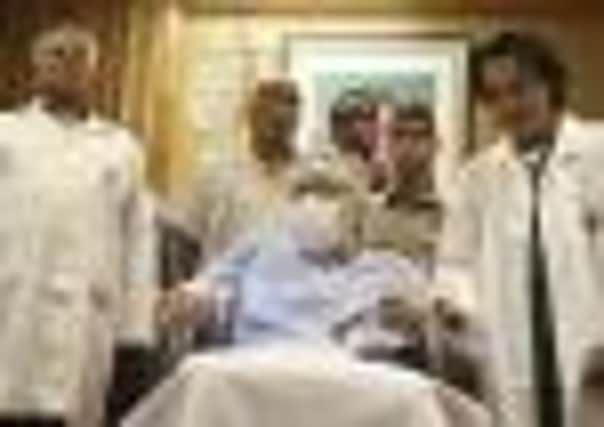Scots men denied drug keeping Megrahi alive


The drug, abiraterone, has been found in clinical trials to extend the lives of prostate cancer patients by an average of four months.
However, yesterday the Scottish Medicines Consortium (SMC) ruled that it would not be accepted for use on the NHS, because the “balance of costs and benefits meant the medicine was not considered to offer value for money”.
Advertisement
Hide AdAdvertisement
Hide AdCancer charities branded the decision “unjust” and said it was a “cruel swipe” at dying men. And it was described as “shameful” that Abdelbaset Ali Mohmed al-Megrahi was benefiting from a drug that Scottish men were to be refused.
Abiraterone, also known as Zytiga, has been linked by a prostate specialist to the prolonged life of Megrahi, who has outlived his three-month prognosis by more than two years.
The National Institute for Health and Clinical Excellence (NICE), the equivalent of the SMC for England and Wales, has passed a draft decision ruling the drug is too expensive.
However, in England, some patients are able to access abiraterone through a special fund, the Cancer Drugs Fund, until a final decision is made by NICE.
And in Wales, it is also available until the final NICE decision, after the All Wales Medicines Strategy Group approved its routine use.
Owen Sharp, chief executive of the Prostate Cancer Charity, said: “In very simple terms, this drug allows men to spend precious extra time with family and loved ones.
“It is unjust that the SMC has made this decision – especially after a closed process that denies these men even the opportunity to have a voice or to appeal.
“This decision sends yet another clear message that investing in treatments for men and prostate cancer is simply not a priority for the NHS in Scotland.
Advertisement
Hide AdAdvertisement
Hide Ad“Those in charge of making these decisions – including the drug company – seem to be focused only on the price of a drug, rather than its value or the needs of men.”
The Scottish Government said the SMC worked independently and they did not get involved in the decisions.
“Scotland has robust and transparent arrangements to appraise newly licensed medicines for clinical and cost effectiveness through the Scottish Medicines Consortium (SMC) and Healthcare Improvement Scotland, who publish advice for NHS boards,” a spokeswoman said. “Both operate independently from the Scottish Government.
“Where the SMC does not recommend a medicine for routine use, NHS boards are not expected to make it routinely available.”
However, she pointed out that NHS boards did have arrangements in place at a local level for clinically-led consideration of SMC “not recommended” medicines for individual patients in certain circumstances.
It was reported in August last year that a source connected with the Tripoli Medical Centre – which had looked after Megrahi following his return to Libya – had credited abiraterone with prolonging the Lockerbie bomber’s life.
Consultant urologist Professor Roger Kirby, founder and director of The Prostate Centre in London, also said last year that he believed the drug was likely to be responsible for Megrahi’s prolonged life.
Yesterday, Scottish Conservative health spokesman Jackson Carlaw said: “That the drug has been credited with extending the life of Mr Megrahi adds deep insult to the injury felt today by many Scottish men, who are to be denied by the SMC the same life-extending opportunity.
Advertisement
Hide AdAdvertisement
Hide Ad“It is shameful that Mr Megrahi was sent home, not so much ‘to die’ but to benefit from a life-extending drug men in Scotland are to be refused.”
He called on health secretary Nicola Sturgeon to “demand the SMC think again”.
Abiraterone is a treatment for men with advanced prostate cancer that has come back after chemotherapy. There are no other treatment options.
About 37,000 men are diagnosed with prostate cancer every year in the UK. Of these, 10,000 have advanced disease.
However, the drug, which is administered as a tablet, costs £3,000 for a month’s supply.
The SMC justified its decision by saying: “SMC did not accept abiraterone for use in NHS Scotland because the balance of costs and benefits meant the medicine was not considered to offer value for money.”
Cancer Research UK, which helped to fund the initial work to develop the drug, criticised the “high price” set by the manufacturer, Janssen, part of the pharmaceutical giant Johnson & Johnson.
Dr Harpal Kumar, Cancer Research UK’s chief executive, said: “We need to find a way for it to be routinely available through the NHS. We’re hugely frustrated that Janssen couldn’t offer the SMC a price they felt was good value for money.
Advertisement
Hide AdAdvertisement
Hide Ad“Generous public donations to Cancer Research UK and other organisations paid for the initial development of the drug, and we feel extremely let down that the drug’s manufacturer couldn’t offer SMC a price they could agree on.”
Abiraterone was licensed by the European Medicines Agency for use in the EU last year.
A spokeswoman for Janssen said it was “disappointed” with the SMC’s decision, but added: “We will continue to explore all options to demonstrate the value of Zytiga.”